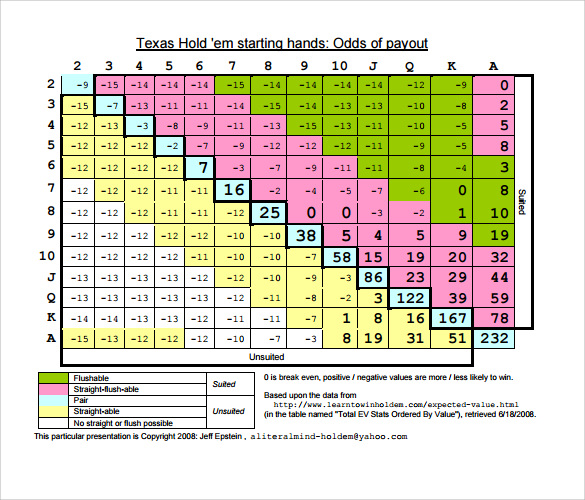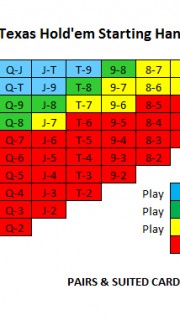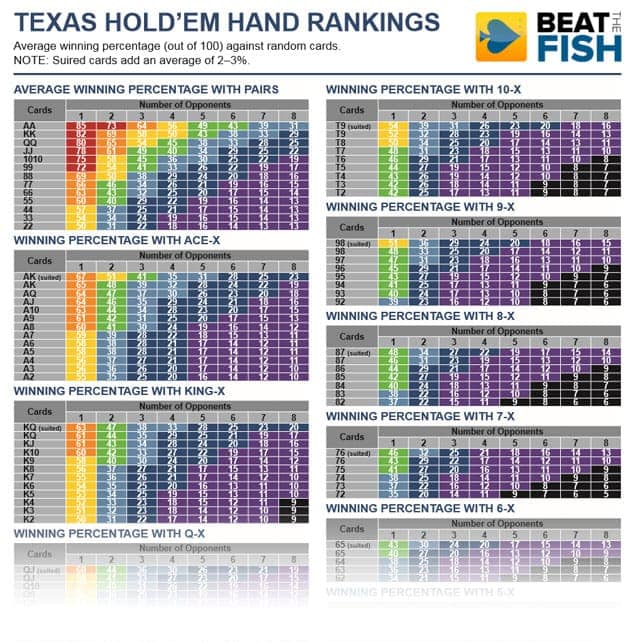Possible Starting Hands In Texas Holdem
The strength of your starting hand in Texas Hold'em can help you determine your chances of winning, even before the remaining cards are dealt. From a pair of aces — the strongest starting hand — to a 2 and a 7, knowing the strength of your starting hand is an important part of your success at the table. When playing Texas Hold'em you need to know which starting hands are worth staying in with—and which you should fold.
While there's no starting hands chart set in stone for Texas Hold'em, it's a good idea as a novice to keep a list of good starting hands printed out and kept by your monitor. Hand selection changes with the style of players at the table or the stage of the tournament you're playing, as well as the number of players at the table.
Best Starting Hands
- You have 169 possible starting hands in Texas hold’em. 13 of those possible hands are pocket pairs, so I’ll start the discussion with those hands. That’s about 7.8% of all your possible hands. The rank of the cards in your pocket pair is the most distinguishing characteristic to think about.
- The PokerStrategy.com Starting Hands Chart for No Limit Texas Hold'em shows you which hands you should play and how you should play them. Simply print it out and you will always know what to do throughout the entire game. Free poker money tip: Before you start playing with your free poker money, click here to download the chart!
- Any of the Texas Hold em starting hands in poker not listed above should be folded. There are couple of things to keep in mind: There are couple of things to keep in mind: Patience which is key to winning should be a part of your strategies for Texas holdem poker.
- Texas holdem Poker is the most popular poker game in the world There are 169 possible 2 card starting hands There are 169 possible 2 card starting hands but only 42 are worth considering under most circumstances. If you are not dealt one of these 42 hands then you will probably save money in the long run by folding and waiting for the next hand.
Having a strong starting hand can help you determine your chances of winning even before the flop is dealt. In general, you're a strong contender if your starting hand contains:
- Ace/Ace: the strongest starting hand in the game.
- King/king, queen/queen, jack/jack: high pairs set you off well.
- An ace with a face card: sets a good foundation, if the flop works in your favor.
Beyond these cards, you'll also often be happy to see cards in sequence, particularly the high cards and face cards, and pairs in your starting hand. While some of these hands aren't always deemed the ideal hands, they can sometimes pay off if you're willing to take a risk. Don't forget the added bonus if your cards are all in the same suit, too. A flush, especially a straight flush or royal flush, can often win you the game. Again, the flop will play a major role in just how strong your chances are at winning, so assess carefully and determine how much risk you're willing to take.

The specific sequence of cards and the order in which they rank is an important aspect of the game. Studying up on the best starting hands in Texas Hold'em can help improve your game and your odds at winning the pot.
A strong starting hand might also encourage you to make a strong blind (your first bet).

Worst Starting Hands

When you're dealt your starting hand, some combinations greatly reduce your chances of winning. These are generally low numbers that are not in sequence or matched. You might consider folding early if your two cards are:
- A 2 or a 3, paired with a 7 or an 8: you can't make a straight out of them.
- An ace or a face card with an unsuited low card: you're taking a risk relying on a single high card.
- Two unmatched, unsuited low cards (like 4 and 7, 5 and 8, etc.): you'll rarely win with these.
The strategy of what to hold, and why, takes a bit to master, so studying the worst starting hands in Texas Hold'em, even more, can help you improve your game.
Beginner's Advice
Play only the cards in the 10-best list and always fold those in the worst hands list. Following this strategy may improve your results. However, there's no guarantee that receiving a strong starting hand will take the round, or that a weak starting hand is a definite loss. You never know how the flop may run, and while an unsuited 2 and 4 might seem like one to deal, sometimes you'll be pleasantly surprised with a two-pair or even a full house. Study up on the various hands you're aiming for.
How you approach the game will also differ based on the game itself. For example, if you're playing No-Limit Hold 'em, knowing the top No-Limit Hold'em hands can help you better understand how to play them.
As your skill increases, you'll also want to learn how position affects your Hold'em starting hand decisions. The more you learn, the more you'll realize how important your starting hands are to your bottom line. Play the good hands and fold the bad, and you'll be well on your way to becoming an expert at Hold'em.
In Texas hold’em, you need stronger hands from early position than from late position.
What does that mean?
Position refers to when you get to play your hand. If you’re in “early” position, you play your hand before most of the other players at the table. If you’re in “late” position, you play yourhand after most of the other players at the table.
Why would that matter?
When you’re playing Texas hold’em, you’re deciding among the following options.
- Betting
- Calling
- Checking
- Folding
- Raising

How Many Possible Starting Hands In Texas Holdem
If you’ve seen what most of the other players are doing with their hands before deciding what to do, you have more information with which to decide. For example, if you have a pair of 7s, and 3players before you have bet, raised, and re-raised, you can be confident that at least one of them—maybe more—have a higher pair than you do. You should fold.
On the other hand, if everyone has called, and you’re the last one to act, you can call, too. After all, you have a chance at hitting another 7 on the flop, turn, or river. If you do, there’slots of money in the pot to be won because of all the players. You will lose with this hand most of the time, but when you do win, you’ll get paid off enough money to make it worthwhile.
Starting Hands In Texas Holdem
For purposes of this post, I’ll only look at whether you’re in early position or late position. Poker writers often also look at middle position, but I think that distinction is unnecessary inlow-limit games and with beginners. Since these are just guidelines or “training wheels” anyway, it won’t make much difference. You’ll deviate from these suggestions just because that’s whatyou’re supposed to do anyway.